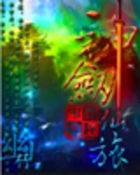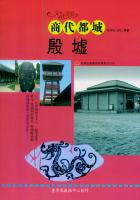There was a signature, but it was illegible--not Kurtz --a much longer word. Hurry up. Where? Up the river? 'Approach cautiously.' We had not done so.
But the warning could not have been meant for the place where it could be only found after approach. Some-thing was wrong above. But what--and how much?
That was the question. We commented adversely upon the imbecility of that telegraphic style. The bush around said nothing, and would not let us look very far, either.
A torn curtain of red twill hung in the doorway of the hut, and flapped sadly in our faces. The dwelling was dismantled; but we could see a white man had lived there not very long ago. There remained a rude table --a plank on two posts; a heap of rubbish reposed in a dark corner, and by the door I picked up a book. It had lost its covers, and the pages had been thumbed into a state of extremely dirty softness; but the back had been lovingly stitched afresh with white cotton thread, which looked clean yet. It was an extraordinary find. Its title was, 'An Inquiry into some Points of Seamanship,' by a man Tower, Towson--some such name--Master in his Majesty's Navy. The matter looked dreary reading enough, with illustrative diagrams and repulsive tables of figures, and the copy was sixty years old. I handled this amazing antiquity with the greatest possible tenderness, lest it should dissolve in my hands. Within, Towson or Towser was inquiring earnestly into the breaking strain of ships' chains and tackle, and other such matters. Not a very enthralling book; but at the first glance you could see there a singleness of intention, an honest con-cern for the right way of going to work, which made these humble pages, thought out so many years ago, luminous with another than a professional light. The simple old sailor, with his talk of chains and purchases, made me forget the jungle and the pilgrims in a delicious sensation of having come upon something unmistakably real. Such a book being there was wonderful enough;but still more astounding were the notes penciled in the margin, and plainly referring to the text. I couldn't believe my eyes! They were in cipher! Yes, it looked like cipher. Fancy a man lugging with him a book of that description into this nowhere and studying it--and making notes--in cipher at that! It was an ex-travagant mystery.
"I had been dimly aware for some time of a worrying noise, and when I lifted my eyes I saw the wood-pile was gone, and the manager, aided by all the pilgrims, was shouting at me from the river-side. I slipped the book into my pocket. I assure you to leave off reading was like tearing myself away from the shelter of an old and solid friendship.
"I started the lame engine ahead. 'It must be this miserable trader--this intruder,' exclaimed the manager, looking back malevolently at the place we had left. 'He must be English,' I said. 'It will not save him from getting into trouble if he is not careful,' muttered the manager darkly. I observed with assumed innocence that no man was safe from trouble in this world.
"The current was more rapid now, the steamer seemed at her last gasp, the stern-wheel flopped languidly, and I caught myself listening on tiptoe for the next beat of the float, for in sober truth I expected the wretched thing to give up every moment. It was like watching the last flickers of a life. But still we crawled. Sometimes Iwould pick out a tree a little way ahead to measure our progress towards Kurtz by, but I lost it invariably be-fore we got abreast. To keep the eyes so long on one thing was too much for human patience. The manager displayed a beautiful resignation. I fretted and fumed and took to arguing with myself whether or no I would talk openly with Kurtz; but before I could come to any conclusion it occurred to me that my speech or my silence, indeed any action of mine, would be a mere futility.
What did it matter what anyone knew or ignored? What did it matter who was manager? One gets sometimes such a flash of insight. The essentials of this affair lay deep under the surface, beyond my reach, and beyond my power of meddling.
"Towards the evening of the second day we judged ourselves about eight miles from Kurtz's station. Iwanted to push on; but the manager looked grave, and told me the navigation up there was so dangerous that it would be advisable, the sun being very low already, to wait where we were till next morning. Moreover, he pointed out that if the warning to approach cautiously were to be followed, we must approach in daylight--not at dusk, or in the dark. This was sensible enough.
Eight miles meant nearly three hours' steaming for us, and I could also see suspicious ripples at the upper end of the reach. Nevertheless, I was annoyed beyond ex-pression at the delay, and most unreasonably too, since one night more could not matter much after so many months. As we had plenty of wood, and caution was the word, I brought up in the middle of the stream.
The reach was narrow, straight, with high sides like a railway cutting. The dusk came gliding into it long before the sun had set. The current ran smooth and swift, but a dumb immobility sat on the banks. The living trees, lashed together by the creepers and every living bush of the undergrowth, might have been changed into stone, even to the slenderest twig, to the lightest leaf. It was not sleep--it seemed unnatural, like a state of trance. Not the faintest sound of any kind could be heard. You looked on amazed, and began to suspect yourself of being deaf--then the night came suddenly, and struck you blind as well. About three in the morning some large fish leaped, and the loud splash made me jump as though a gun had been fired.















